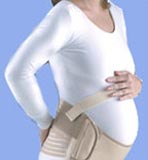Pregnancy Back Pain
The weight of an unborn baby and the softening of ligaments during pregnancy mean that between half and three-quarters of expectant mothers experience some form of back pain during their pregnancy.
 Fortunately, there are many things you can do to prevent back pain, or, if you do experience it, to alleviate the pain and prevent it from turning into a long-term problem after your baby is born.
Fortunately, there are many things you can do to prevent back pain, or, if you do experience it, to alleviate the pain and prevent it from turning into a long-term problem after your baby is born.
Causes
All the reasons that cause back pain when you aren’t pregnant apply just as much – if not more- during pregnancy. Poor posture, bad lifting technique, weak or tight muscles, and injury can all put your ligaments, muscles, discs, and joints under stress or strain. If you’re pregnant and you’ve been on your feet for a long time, you may find that your back pain gets worse. It can also worsen towards the end of the day because your back muscles become tired and your ligaments stretch slightly from the weight of your body. The additional weight of the growing baby makes the strain – and the pain – worse. However, there are also issues specifically related to pregnancy that can contribute to back pain.
Pregnancy-specific causes
Changes in your hormone levels can cause your muscles and ligaments to become more relaxed, especially during the last few months of pregnancy, as your body prepares itself for labor. The weight of the growing baby may lead to a curvature of your lower spine, causing your ligaments and muscles to feel strained. The growing baby also forces your organs to move up and back, which in turn can cause your rib cage to expands, resulting in pressure on the muscles that connect your ribs. Finally, your center of gravity slowly shifts, again to accommodate the weight of the baby, which in itself can result In back pain. To correct this, try to consciously sand with a firm base, keeping your feet shoulder-width apart.
Other common causes of back pain during pregnancy include pelvic girdle pain (PGP) and sciatica. PGP results from the softening effect of the ligaments and leads to instability in the pelvis, which in turn creates pain and inflammation. (If you have pain that’s located at the front of your body, this known as symphysis pubis dysfunction (SPD), where the softening effect on the ligaments is targeting the usually stiff joint (symphysis pubis) that connects the two halves of your pelvis. The softening effect can then produce pain and inflammation at the front of the body.)
The sciatic nerve is the longest nerve in the body, running the length of your spine and down each leg. Sciatica, which is the name given to describe the pain you feel (the symptom), occurs when something compresses or causes inflammation in the sciatic nerve as it leaves the spine. In the case of pregnancy, the compression comes from your expanding uterus. This can sometimes impair nerve function, causing tingling in your legs and pain down the back of your leg. The problem can be ongoing, even after your pregnancy is over.
When back pain is cause for concern
Most pregnancy associated back pain will subside when your body readjusts after the delivery of your baby. However, there are several kinds of backache during pregnancy that need treatment, so never ignore anything that you think seems unusual or suspicious. A dull, low backache may be a sign of pre-term labor, while severe back pain or back pain accompanied by vaginal bleeding or discharge needs to be checked out by your doctor. As a rule of thumb, if you’re concerned about your back pain, contact your doctor right away.
Conventional treatments
Although back pain can be debilitating, always check with your doctor before taking any kind of painkilling medication while you’re pregnant. In my opinion, unless your pain is excruciating and prevents you from functioning properly, you should avoid any kind of drug during pregnancy and instead try the natural approaches.

